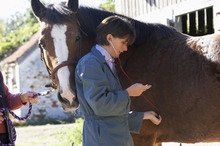As the year 2015 ended, confirmed cases of three horse diseases in various states made equine news. In Pennsylvania, confirmed cases of the Equine Herpes virus, a neuropathogenic variant of EHV-1 were listed in the Doylestown area.

Veterinarian checking horse's vital signs
The Equine Disease Communication Center of the US urges all horse owners to follow well-documented biosecurity protocols to prevent the spread of horse diseases.
The results of a test confirmed a case of the neuropathogenic variant of EHV-1 the night of December 23rd in a private, pleasure horse riding stable in Doylestown, PA .So far, three horses have been euthanized with clinical signs of EHM. Two additional horses in the same facility were noted as being febrile without neurologic signs to this point.
One of the three euthanized horses had been shown at an event in New Jersey on December 12, 2015. Trace activity is underway. A Pennsylvania Department of Agriculture quarantine was imposed at the boarding stable in Doylestown on December 22nd.
The Department has been working closely with all equine stakeholders and reminding everyone of the importance of strict biosecurity applications in the control of this disease. The department is responding to this situation consistent with our science based EHV-1 response protocol.
A minimum quarantine period is 21 days from the last significant clinical finding (e.g. fever) as well as the use of pcr testing for EHV-1 when appropriate.
A new strangles case was reported by the treating veterinarian on December 14th in Okeechobee County, Florida fter culture results returned positive for the disease. The property with 7 horses and numerous donkeys was placed under quarantine. These was the second case of Strangles in Okeechobee county and the 30th case for Florida in 2015.
A new case of Eastern Equine Encephalitis has been reported in Levy County, Florida. Clinical signs began in early December. The four year old mini mare had not been vaccinated in the past year, had no recent travel history and was euthanized due to poor prognosis. This is the first confirmed case in Levy County and the 22nd positive in Florida since the beginning of the year.
The Equine Disease Communication Center of the US urges all horse owners to follow well-documented biosecurity protocols to prevent the spread of horse diseases.
Biosecurity is a set of preventive measures designed to reduce the risks for introduction and transmission of infectious disease. Infectious disease caused by bacteria and viruses may be brought to and spread at an equine facility by horses, people, domestic animals other than horses, vehicles, equipment, insects, ticks, birds, wildlife including rodents, feed, waste and water.
Disease risks are inherent when horses commingle and travel. Complete elimination of all disease risks for a horse that has contact with horses outside of itâs herdmates is highly unlikely.
Horse owners must determine the acceptable level of disease risk they are willing to assume for their horse and implement biosecurity measures to reduce disease risk where possible. Implementing biosecurity measures is an important part in protecting the health of the equine industry.
Beat the Bugs Poster - Biosecurity measures for horse owners
Biosecurity for horses includes measures that can be taken by the horse owner was well as event managers. Part of a biosecurity plan include disinfection, horse movement, isolation and quarantine, event plans for biosecurity, and risk assessment. Equine Guelph has developed a colorful poster "Beat the Bugs" that gives detail about ways horse owners can be proactive in preventing the spread of infectious horse diseases.
